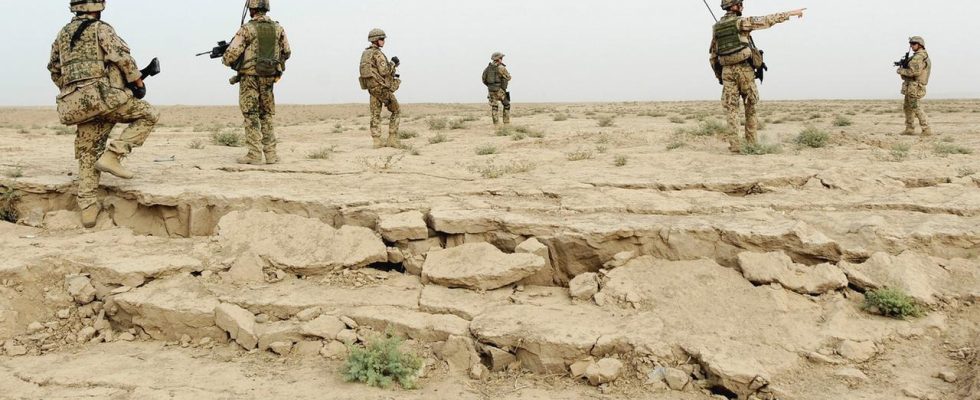What went wrong with the German mission in Afghanistan? The Bundestag Study Commission wants to provide answers to this question in a report next week. Soldiers have been waiting for this for a long time.
Afghanistan is now a Taliban state again. It is firmly in the hands of the Islamists who ruled the country when the international community, led by the USA, began its operations in the Hindu Kush in 2001.
How could that happen? “I’m really angry. And many of my combat veterans are angry that we don’t get an answer from politicians. Until today,” complains former Bundeswehr soldier Robert Müller.
He was one of the first German soldiers sent to the Hindu Kush in early 2002. Müller returned seriously wounded emotionally. To this day he suffers from post-traumatic stress disorder.
He would have liked politicians to at least have the courage to apologize. “That’s a reproach that I still make to politicians today, that no one explained to me before it started: What is actually the political will to be there?” These are questions that not only veterans like Müller ask themselves.
Hardly any expertise, hardly any preparation
Anyone looking for answers must go back to the beginning, to the roots of the operation. After the attacks on the USA on September 11, 2001, it quickly became clear that Germany and the Bundeswehr would also be involved in Afghanistan alongside its ally, the USA.
But no one was prepared for this – neither the Americans, nor Germany or other parties involved, said the Afghan parliamentarian and women’s rights activist Shukria Barakzai in retrospect: “There was no goal, what kind of Afghanistan they wanted to have. There was no plan, no strategy .”
Diplomats confirm that there was hardly any real Afghanistan expertise within the federal government at the time. The German armed forces had gained experience abroad in the Balkans, but were already overloaded.
From the political decision to participate in an Afghanistan Protection Force (ISAF) in December 2001 to the actual deployment, the armed forces only had a short preparation phase.
With the result that one “hastyly gathers up backpacks and the like and goes to the country of deployment in order to bear the appropriate responsibility there,” criticizes Carl-Hubertus von Butler in an interview with the NDR. Von Butler was commander of the first Bundeswehr contingent that arrived in Kabul in early 2002.
Initially high expectations
And yet: the welcome for the first soldiers was warm. After the fall of the Taliban and decades of war, Afghans dreamed euphorically of a better, more peaceful future. The international mission started with correspondingly high expectations – also for the Germans.
But after just a few weeks, a tragic accident plunged the Bundeswehr contingent into its first deep mental valley. On March 6, an old Russian rocket detonated as soldiers tried to defuse it. “The five comrades around me somehow flew past. And I still remember that I was in a fireball, being thrown through the air,” soldier Müller remembers. From that moment on he saw everything in black and white and with a time delay. Two German and three Danish soldiers fell victim to the blast.
At what point did something go wrong?
The policy promise was to draw lessons from the failed Afghanistan mission. Which mistakes should definitely not be repeated in future operations? At least parts of politics are now trying to keep the promise made and find answers to the question of exactly when and when it went wrong in the Hindu Kush. The Bundestag Study Commission will present its interim report on this next Monday.
Even if Afghanistan’s fate was by no means sealed from the start, the first mistakes happened early on. The powerful but hated “warlords” in Afghanistan were not removed from power as enemies of the Taliban, but were given political influence and money. “You just paid the warlords to work with you and not join the Taliban,” explains former diplomat and Afghanistan expert Thomas Ruttig.
A system of corruption was not only tolerated, but also promoted with Western money. Attempts to democratize the country failed. The much-vaunted German “networked approach”, the interlocking of security through the military and development aid, has not worked, says Michael Müller, chairman of the Bundestag’s study commission.
The list of shortcomings goes on: Germany, which is responsible for this, failed to set up the Afghan police force. A diplomat calls the number of officials sent by the Interior Ministry “ridiculous.”
Processing for future use
But foreign missions will continue to be a task for Germany and the Bundeswehr given the increasing number of crises worldwide. “Germany, the largest economy in the middle of Europe, is expected to play a role” – this is how SPD foreign policy expert Michael Müller puts it. Politically, diplomatically, but also militarily. “Hesitating or ducking away with the hope that others will do the work – it won’t work that way anymore.”
This makes it all the more important to come to terms with past operations. From the Bundeswehr’s point of view, one could add: It is precisely those who lost their lives in Afghanistan or who returned traumatized that they owe answers and lessons to be learned. In any case, ex-soldier Robert Müller is still waiting for answers from politicians.
Kai Küstner, NDR currently Dakar, tagesschau, February 16, 2024 2:49 p.m

